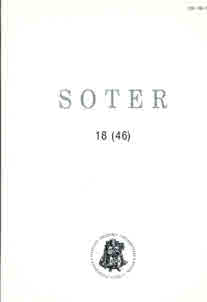Žinojimo ir tikėjimo santykis apofatinėje mistinėje patirtyje
The relationship between the knowing and the belief in the apophatic mystical experience
Author(s): Agnė BudriūnaitėSubject(s): Christian Theology and Religion
Published by: Vytauto Didžiojo Universitetas
Summary/Abstract: The ‘knowing’ presupposes something what is perceived by the means of rationality and logic according to the objective reality and is independent from personal sentiments, experiences and impressions. The ‘belief ’ designates something that is unachievable to our reason and logic. The dividing line between the belief and the knowing is not so clear in the mystical experience. It is totally different, we can say. The objective of this article is the relationship between the knowing and the belief in the apophatic mystical experience, the different forms of the knowing and the possibility of their communication. The mysticism is usually attributed to the field of faith. This is true if we think about mysticism as an unio mystica theology. But the concrete conception of Deity may be absent in the mysticism and the mystical knowing may be understood as a part of philosophy as well. The ordinary knowing is reasonable and sensual but is far from the knowledge achieved through the mystical experience. The mystical knowledge is a personal knowing. Two kinds of mysticism – kataphatic and apophatic – are distinguished according to the character of the experience. R. Otto calls the kataphatic mysticism based on the sensual experiences ‘occult’, ‘magic’, ‘empirical and hyper-physically sensualistic’. The various visions and ‘paranormal experiences’ are determinant in such kind of mysticism. The kataphatic mystical experience is a waftftft rather than an experience influencing the whole life. The main attention is paid to the apophatic mysticism therefore. The apophatic mysticism denies both rationalized conceptual knowing about God and pure sensual experience of God. It is related to the senses as well as to the reason nevertheless. The apophatic mysticism points out the wordless experience as the very name of it shows. The fruit of such experience are called the mystical knowing. The differences between the mystical knowing and the scientific knowing are discussed in the article. The knowing of a mystic does not become the bases for the knowledge of other people contrary to the scientific knowing. It is impossible to understand the mystical truth by the means of reason. One can say that not all scientific truths are understandable too. The non-understanding of scientific truth is concerned with the lack of knowledge, while the non-understanding of mystical truth is conditioned not only by the lack of inner readiness but also by the incommunicability of this truth as the very essential attribute of it. The mystics maintain that the mystical experience is indescribable, unresearchable and super logical. It is the objective of the scientific research nevertheless. The intersection of subjectivity and objectivity reflects in the texts concerning the mystical experience. In the article I discuss the relationship between subjectivity and objectivity rather in the attempts to communicate it than in the very mystical experience.
Journal: SOTER: religijos mokslo žurnalas
- Issue Year: 46/2006
- Issue No: 18
- Page Range: 15-27
- Page Count: 13
- Language: Lithuanian

